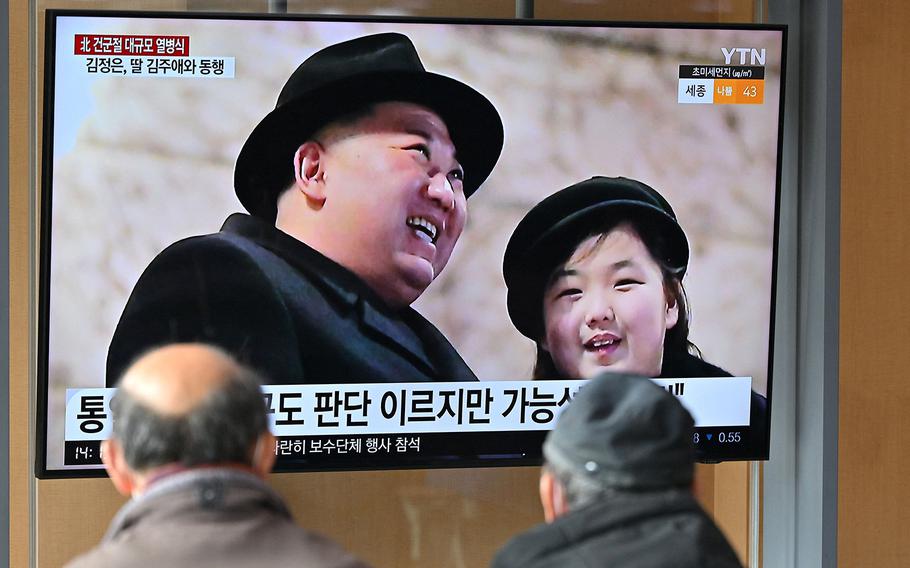
In this file photo from Feb. 9, 2023, people watch a television screen showing a news broadcast with an image of North Korean leader Kim Jong Un (left) and his daughter, presumed to be named Ju Ae (right), attending a military parade held in Pyongyang to mark the 75th founding anniversary of its armed forces, at a railway station in Seoul. (Jung Yeon-Je, AFP via Getty Images/TNS)
(Tribune News Service) — North Korea appears to be purposefully cutting a communication link with South Korea as it ratchets up tensions by testing new weapons and denouncing its neighbor as a “puppet traitor” for holding military drills with the U.S.
South Korea’s Unification Ministry said Monday that North Korea failed to respond for a fourth straight day to regularly held calls on an inter-Korean liaison communications channel. The calls are normally held on weekdays at 9 a.m. and 5 p.m.
“We’re weighing the possibility of a unilateral cut-off” by Pyongyang, spokesman Koo Byoung-sam told reporters at a news briefing. He added this is the first time since Oct. 2021 that all inter-Korean military lines or liaison calls have been stopped for more than a day.
The two Koreas, which are technically still at war, don’t have regular phone service. They set up hotlines in 2018 after a series of summits aimed at decreasing tensions on their heavily armed border. But North Korea has previously shut the communications links in displays of anger.
“I believe it is a part of its political-diplomatic response, a way of expressing its strong disgruntlement against the U.S. and South Korea’s joint exercises,” said Go Myong-hyun, a senior fellow of the Asan Institute for Policy Studies.
“It’s unlikely a step toward escalation, but more of a tit-for-tat response against the joint military drills and much more elevated deterrence posture from South Korea and the U.S.,” Go said.
The U.S., Japan and South Korea this month held joint anti-submarine drills in waters off the South Korean island of Jeju. North Korea responded by warning that the U.S. and its “puppet state” allies were bringing grave danger to themselves and saying its nuclear arsenal was ready to be used at any time to deter the “war maniacs’ reckless moves.”
Kim Jong Un’s regime has pledged an unprecedented response to the drills and rolled out new weapons designed to deliver nuclear strikes against the U.S. and the two allies, which host the bulk of American troops in the region. That response also included a new undersea “Haeil” drone North Korea tested last month and this month that it said could deliver a “radioactive tsunami” — a claim doubted by South Korea’s military.
“All these military exercises of the enemy for demonstration clearly show that they are military actions for a preemptive attack which can not be looked on with folded arms any longer as they are waged after making a war of aggression against the DPRK a fait accompli,” it said in a recent commentary in its biggest paper, Rodong Sinmun, referring to North Korea by its formal name.
The inter-Korean hotline was restored in July 2021, after being cut by North Korea for about a year in protest against South Korean activists who sent leaflets critical of Kim’s regime across the border by balloon. A few weeks later the lines were cut again for about two months in a show of anger from Pyongyang over joint military drills.
In June 2022, North Korean did not respond to a regular hotline call, apparently due to technical glitches caused by heavy rains.
“The question then becomes whether this is a temporary protest and it restores communications after a certain time, as it has done in the past, or whether this is the first step toward a bigger policy change,” said Rachel Minyoung Lee, regional issues manager at the Vienna-based Open Nuclear Network.
“North Korea in recent weeks has issued two highly authoritative articles on the situation on the Korean Peninsula, which suggests they are at a major decision point with regard to foreign policy,” said Lee, who worked as an analyst for the CIA’s Open Source Enterprise for almost two decades.
With assistance from Shinhye Kang.
©2023 Bloomberg L.P.
Visit bloomberg.com.
Distributed by Tribune Content Agency, LLC.